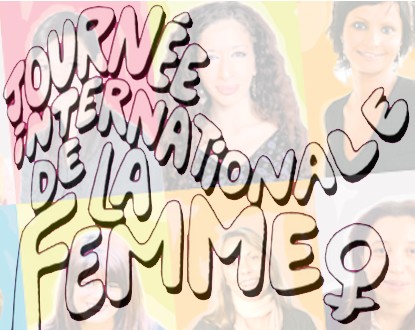The Women’s Rights Collective 06 is organizing an event on Thursday, March 8, the International Women’s Day, starting at 6:30 PM at Justice Palace Square in Nice. Video screenings, a “household” brass band, songs, snacks, leaflet distribution… under the theme: “But what do they want NOW? Equality NOW!!!”
This equality is recognized in texts, but women are tired of demanding the rights they have gained or laws that are not enforced. They’re fed up with being invisible!
Women’s rights are stagnating, even regressing. Rooted in the patriarchal system and capitalism, inequalities between women and men persist. Wage gaps, unequal distribution of household tasks, lack of parity, glass ceiling, precariousness, degraded image in the media, sexist and sexual violence, domination, discrimination: STOP!
A real political will is necessary. Equality between women and men is an essential condition of progress, democracy, and the emancipation of everyone.
The origin of March 8 is rooted in workers’ struggles and the numerous demonstrations by women demanding the right to vote, better working conditions, and equality between men and women, which shook Europe at the beginning of the 20th century.
This year, more than ever, March 8 is a day of solidarity with women who are rising and fighting everywhere in the world, especially at the heart of the Arab Springs.
PARITY: INVISIBILITY
France ranks 48th in the global parity ranking.
Today only 18.5% of deputies and 22% of ministers are women.
45% of candidates in the last legislative elections, but only 18.5% elected!
General Council 06: 7.7%
Municipal councilors: 32%
Female mayors: 11%
French population: 51.4%
The lack of parity is linked to electoral systems but also to general gender inequalities.
SEXISM
The differences between social roles are not natural: they are socially constructed, meaning they result from our social environment and upbringing.
Toys, children’s literature, language, films, TV shows, and advertisements are all elements that feed stereotypes. These stereotypes are at the root of inequalities experienced daily by women: segregation in orientation, in employment, in sports, in media, etc.
Sexism is also expressed through images that equate women to objects (advertisements), through sexist remarks (media, humor), or comments that downplay violence against women.
These clichés reinforce ordinary sexism and contribute to perpetuating the invisibility of gender inequalities. Male domination is still considered “natural.”
Parenting is still too often considered a women’s issue, with 80% of domestic and educational tasks still assumed by women. The female body is more than ever a commodity.
SPECIFIC RIGHTS OF WOMEN
While the right to abortion was hard won over thirty years ago, it is now being challenged in its implementation. Free and accessible contraception is far from a reality.
• Nearly 100 abortion centers have closed in France between 2000 and 2006;
• Every year, 5,000 women go abroad to have abortions because they couldn’t get an appointment in France within the time limits.
Employment, salary, retirement: it’s still and always precariousness
Professional inequalities between women and men are worsening. Women are still more likely than men to have jobs under contract:
• Fixed-term: 9.4% of women in the total employment are on fixed-term contracts compared to 5.5% of men
• Part-time: 81.5% of part-time jobs are held by women; 30% of working women have part-time jobs, compared to 6% of men
• Low or unskilled: 62% of so-called unskilled jobs are held by women
• Low-wage: 80% of low-wage earners are women, more than 1 in 4 female employees earn a low wage compared to just 1 in 10 men; considering the very low wages, 17% of women are affected compared to 4% of men.
Their unemployment rate is higher: 2 percentage points above men. Women receive on average a pension that is about 40% lower than that of men, and for half of them, it is less than 900 euros per month. The average wage gap between men and women is 23.6% in the private sector and 17% in the state civil service.
VIOLENCE
Violence against women is specific and gender-related: affecting women because they are women. Because they are still accepted, tolerated, and even minimized, these violence occur in both the private and public spheres:
• Domestic violence: In France, on average, a woman dies every two and a half days as a result of couple violence.
• Rapes: 75,000 women per year in France
• Forced marriages, female genital mutilation, and various forms of slavery.
• Prostitution involves approximately 18,000 people in France according to the central office for the suppression of human trafficking, with the vast majority being foreign and/or coerced.
In response to this list of discrimination, the Women’s Rights Collective 06 demands the consideration of:
A real political will in the fight against violence against women
Equality in jobs and wages now
The repeal of the HPST Law (Hospital, Patients, Health, and Territories) to stop the dismantling of public hospitals and preserve our maternity and abortion centers
Free and accessible contraception and abortion across the territory
The right to decent housing with affordable rent, the application of the Dalo Law (Enforceable Right to Housing)
Unconditional accommodation for all women, with or without papers
The development of a public early childhood service and the creation of one for dependent persons
A true education that is neither sexist nor homophobic
The freedom to choose one’s sexuality
An autonomous status for migrant women and the right of asylum for women persecuted in their countries because they are women
The regularization of undocumented people
The abolition of the prostitution system
The adoption of a new parity law with list-based elections, non-cumulation of mandates, and the removal of subsidies from political parties that do not respect the parity obligation
A real Ministry of Women’s Rights with real powers, safeguarding our associations providing public service missions


